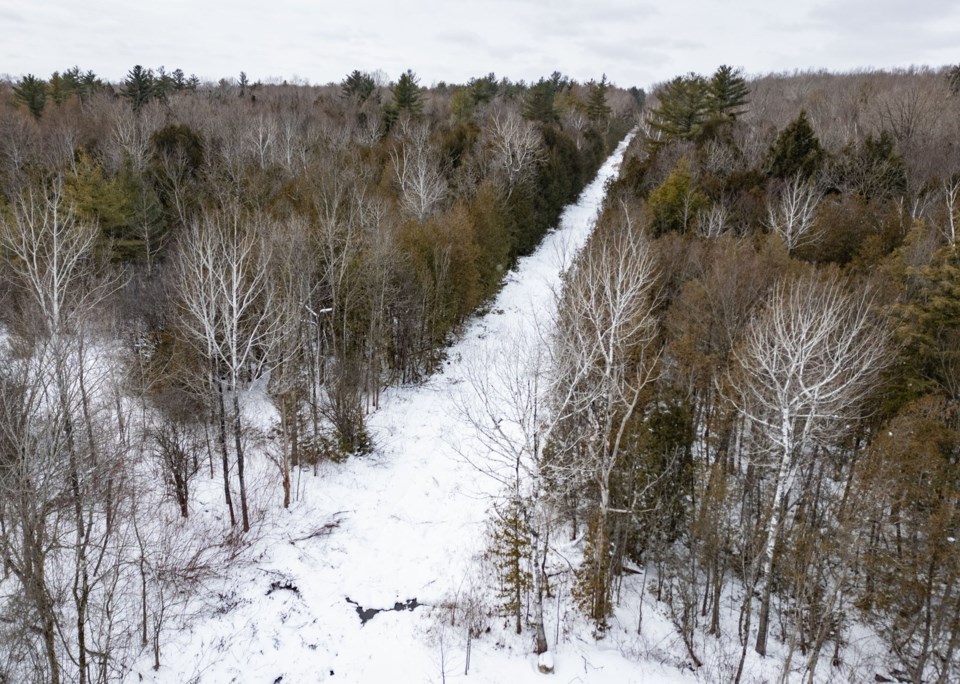MONTREAL — A 44-year-old Haitian man found dead in 2023 after he had tried to cross into the United States made a final phone call to his wife before succumbing to hypothermia and drowning in shallow water, a coroner has found.
The body of Fritznel Richard was discovered on Jan. 4, 2023, in a ditch containing 45 centimetres of water near the U.S. border in St-Bernard-de-Lacolle, Que., says the report by coroner André-H. Dandavino.
Richard had been living in Montreal but wanted to join his wife, who had already crossed to the United States, in the hopes of obtaining a green card. He died trying to cross the border on foot through some fields on Dec. 23, 2022.
That night, as heavy snow fell around him, Richard called his wife and told her he was tired and his legs and feet were frozen.
"I’m cold, I have things on my head that I can’t get off, I’m falling, I’m falling," he told her, according to the coroner's report. Moments later, she heard him fall and the line cut out.
Richard was officially reported missing by family on Dec. 26, Dandavino says in his report, but the man's body was only found by authorities more than a week later, after a search by both Canadian and U.S. officials.
Dandavino says Richard was dressed warmly but "very probably" suffered from hypothermia. His lungs were hyperinflated, which is consistent with drowning.
"Hypothermia can lead to a loss of consciousness and, if this happens in a hostile environment such as a body of water, this loss of consciousness can lead to drowning," the coroner wrote.
Frantz André, the spokesman for a group that helps undocumented migrants, said he became close with Richard's family after the death.
He said Richard came to Canada with his wife and young child as asylum seekers, after a long path that began in Haiti and took them through Brazil and the United States. However, Richard, who also had a child back in Haiti, struggled to find affordable housing in Canada and was waiting for a work permit, which was delayed.
The situation became more desperate when his wife fell ill and returned to the United States through the same crossing Richard would later attempt, André said.
"He knew that his wife would not be able to work. So by having his (Canadian) work permit, the intent was for him to send money to (his wife), but the work permit never came," he said in a phone interview.
André said Richard hired a smuggler to bring him to the border, but believes the two had a disagreement that led to Richard being dropped off in the wrong place. An autopsy found no drugs or alcohol in Richard's system, and he did not have COVID-19.
The coroner noted that Richard had some health conditions, including a nodule near the pituitary gland "suggestive of" meningioma — a kind of tumour — as well as coronary artery disease and diabetes. However, he ruled Richard's death accidental. The man died of drowning, brought on by hypothermia, a death that highlights the danger of furtive border crossings, the coroner said.
"Mr. Richard died while trying to cross the Canadian border across fields to reach the United States on foot, while the weather was dangerous for everyone who is outdoors,” he wrote.
“This death demonstrates the dangers of attempting to clandestinely cross the Canada-U.S. border in rural areas outside of border crossings.”
Other migrants have died while trying to cross the border from Quebec in recent years, including a 45-year-old Mexican man who collapsed and died shortly after crossing into Vermont in February 2023, and a 33-year-old pregnant woman from Mexico whose body was found in the Great Chazy River near Champlain, N.Y., in December of that year.
In March 2023, the Canadian and U.S. governments expanded a border deal called the Safe Third Country Agreement, limiting the ability of migrants to cross between official border points to claim asylum, and closing a popular irregular passage on Roxham Road, south of Montreal.
André believes that the tightening of restrictions has only led to a rise in human smuggling and dangerous passages for people who haven't stopped trying to cross. He hopes Richard's story is a reminder that asylum seekers are people, not just numbers.
"They're human beings that believe they can dream of a safe place to be," he said. "And Canada is no longer a safe place, the United States is no longer a safe place."
André says he still has Richard's possessions, which were given to him after his death. To this day, he says he still can't bring himself to go through them.
This report by The Canadian Press was first published Jan. 22, 2025.
Morgan Lowrie, The Canadian Press



